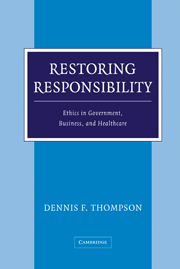Book contents
- Frontmatter
- Contents
- Acknowledgments
- Restoring Responsibility
- Introduction: The Need for Institutional Responsibility
- PART I DEMANDS OF INSTITUTIONAL POLITICS
- PART II VARIETIES OF INSTITUTIONAL FAILURE
- 6 Democratic Secrecy
- 7 Mediated Corruption
- 8 Election Time
- 9 Hypocrisy and Democracy
- 10 Private Life and Public Office
- Part III EXTENSIONS OF INSTITUTIONAL RESPONSIBILITY
- Credits
- Index
7 - Mediated Corruption
Published online by Cambridge University Press: 29 January 2010
- Frontmatter
- Contents
- Acknowledgments
- Restoring Responsibility
- Introduction: The Need for Institutional Responsibility
- PART I DEMANDS OF INSTITUTIONAL POLITICS
- PART II VARIETIES OF INSTITUTIONAL FAILURE
- 6 Democratic Secrecy
- 7 Mediated Corruption
- 8 Election Time
- 9 Hypocrisy and Democracy
- 10 Private Life and Public Office
- Part III EXTENSIONS OF INSTITUTIONAL RESPONSIBILITY
- Credits
- Index
Summary
The case of the “Keating Five” – featuring five prominent U.S. Senators and Charles Keating, Jr., a savings and loan financier who contributed to their campaigns – has “come to symbolize public distrust of elected officials” and has reinforced the widespread view that many members of Congress and the institution itself are corrupt. The nine months of investigation and seven weeks of hearings conducted by the Senate Ethics Committee that concluded in January 1992 revealed an underside of the system of representation in the United States to a depth and at a level of detail rarely seen before or since.
The broad shape of this under side is familiar enough: politicians take money from contributors to get elected, then do favors for them. But the deeper significance, theoretical and practical, is to be found in the details and in the relation of those details to principles of democratic representation. Although the case reveals a darker side of our politics, we can still try to recognize degrees of darkness. We should aim for a kind of moral chiaroscuro. More generally, the case can help us to better understand a more subtle form of political corruption that is becoming increasingly common but has not received the attention it deserves from political scientists or political theorists.
This form of corruption involves the use of public office for private purposes in a manner that subverts the democratic process. It may be called mediated corruption because the corrupt acts are mediated by the political process. The public official's contribution to the corruption is filtered through various practices that are otherwise legitimate and may even be duties of office.
- Type
- Chapter
- Information
- Restoring ResponsibilityEthics in Government, Business, and Healthcare, pp. 143 - 173Publisher: Cambridge University PressPrint publication year: 2004



